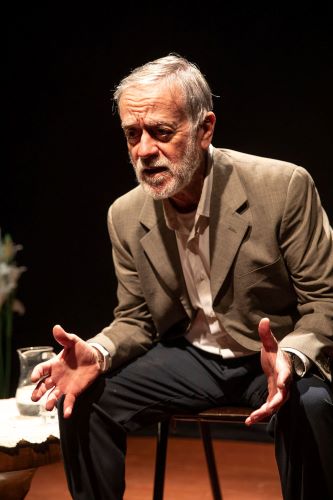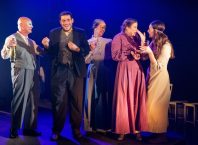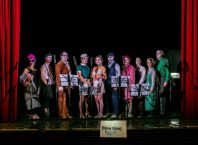A man stands on a stage, he is no longer young, and he has a message to convey. In Mor Frank’s adaptation of A.B. Yehoshua’s novella Early in the Summer of 1970, Yehoyachin Friedlander portrays a Bible teacher on the brink of retirement, as he addresses graduates and their parents at a commencement ceremony. The stage is arranged with stark simplicity: there is a small table with a pitcher of water and a glass, a chair, and several arrangements of white flowers. There is a sense of intimacy, as the teacher delivers his speech, it feels as though he is speaking directly to us, the audience. And he is.

The renowned novelist A.B. Yehoshua, who died on June 14, 2022, was a lifelong peace activist, and the novella, which is set towards the end of the War of Attrition (July 1967 – August 1970), with its commentary on the futility of war, the loss and anguish that it brings, remains all too relevant. Frank’s adaptation was created with Yehoshua’s full consent to her creative freedom, although he died before the play’s first reading. The commencement ceremony provides a framework for the teacher’s ruminations and retains the sense of Yehoshua’s text with its stream of consciousness so well, that it feels as though the novella were written with the intent to become a monodrama.
The Bible teacher is desperate to communicate his message, so intent, that he repeats himself, returning several times to the same, critical, defining, moment. Yet the message most keenly felt in this play is the breakdown of communication. Having reached the official age of retirement, the teacher refuses to accept this new reality and, as he recounts, he “forced” his way back into teaching. Friedlander embodies the character of the aging Bible teacher with every cell in his body. As he describes his evasive struggle with the school’s principal, there is a spark in his eyes, and a new energy to the way he holds himself; he has enjoyed the challenge. Yet although he found a way to continue teaching, there is a breach between him and the principal, as well as his fellow teachers. In his description of the students, the seniors in his classroom, there is a sense of distance as well. In fact, he does not describe teaching at all, but rather, a day on which he gives his students a test.
He talks about his son, and here too, there is a feeling of distance and a lack of communication. As he describes greeting his son, who has returned after a long absence with a wife and a child of his own, the desire for closeness can be seen in his expression, enhancing the sense of distance, a father and son who are strangers to one another.
Friedlander delivers a riveting, moving performance, drawing the viewer into the experiences of the elderly teacher in his struggles. One lives through that day and night with him, feeling his sorrow, frustration, hope, and suspense. In the timbre of his voice, and in the anguish of his silence, Friedlander conveys the man’s loss, and the harrowing understanding that he too has been complicit in perpetuating a story that repeats itself endlessly as parents send their children to war.
Early Summer 1970
Based on a novella by A.B. Yehoshua
Adaptation and direction: Mor Frank; Actor: Yehoyachin Friedlander; Set and Costume Design: Alona Rudnev; Lighting Design: Roni Cohen





